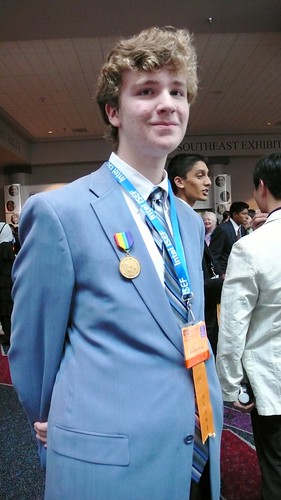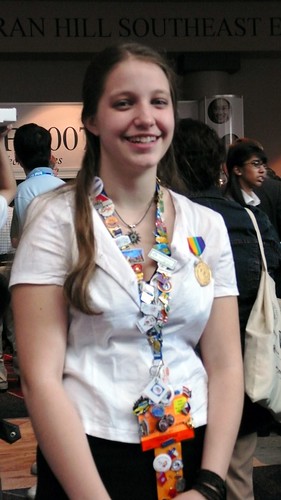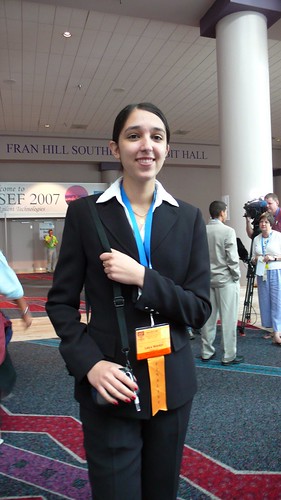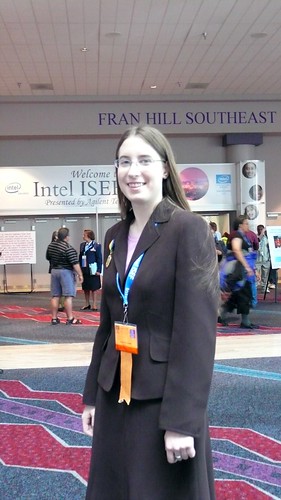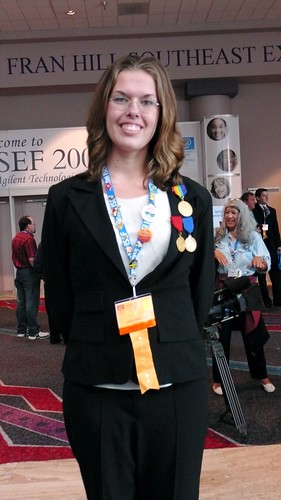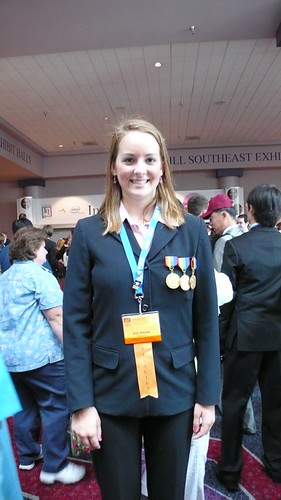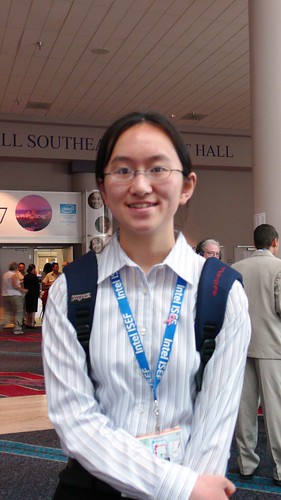Since no members of the media are allowed inside during judging, we waited until the finalists emerged for their lunch break at 11:45 and asked ten of them to tell us about their projects and their interactions with the judges.
First up, we spoke with Joseph Stunzi, a 17-year-old from Athens, Georgia with a project on enzymatic hydrogen production.
"I've seen eight judges in this first session. It's been pretty positive -- one judge got cut off short, though. Two of the eight were scheduled judges who came to see me, and the other six were special judges. I did have some trouble answering a question about the implementation of my research and about economics, numbers and figures that I haven't really worked out yet. I more or less told them the truth, that I didn't know the exact numbers, then I referred them to a research paper that does talk about numbers and theories and stuff like that. I think telling the truth is the best because if you lie and they figure out that you lied, then you're going to get no points. It's all about making sure you're in the highest regard of your judges."
"My name's Aschah Williams, I'm 15 years old, and I'm from Tianjin, China. I'm an American expat; I've lived there for six years. My father's a teacher there. My project is about the effects of toothbrush design on the density and type of bacteria present. I found that different toothbrush designs don't really affect the type of bacteria found, but rather the density of bacteria. So far, I've seen two judges, that's all. The first one did not go well, but the second one went pretty well. For the first one, I don't think I was prepared for the questions that she asked. She wanted me to summarize my project in two minutes rather than the long thing that I had planned out, so it was a little more difficult for me to hit the broad points and kind of skip the details."
"I'm Laila Wahedi. I'm 18, from Portland, Oregon, and my project is about crosstalk between insulin-like growth factor 1 (IGF-1) and insulin, and action on the insulin receptor. It's really important both for cancer research and diabetes research. So, I looked at cell transduction for insulin and determined that insulin acts on the IGF-1 receptor to cause growth through the mitogen-activated protein kinase pathway (MAPK), and IGF-1 acts through both pathways to cause growth. But one pathway causes mitogenic activity and the other causes proliferative activity."
"This is my first time at ISEF. Compared to other fairs, these judges are so qualified! It's great because you don't have to explain much of the background. You can go right into the implications, and discuss the results of your experiment because they're already qualified, they already understand it. One judge in particular said I should ensure I continue with my research because of the potential implications, and she said if I don't, I should find someone who is in the field to continue with it, contact a Ph.D who is working on this, because she thought it was important."
"My name's Elisabeth Baseman, and I'm from Brewster, New York, but I'm representing Connecticut, and I'm 17 years old. My project is titled 'EMMA: Determining the Effects of Environmental Disasters on Ecosystems.' I found that as carrying capacity increases, ecosystems become increasingly unstable. It's interesting because it implies that there is some threshold value for carrying capacity above which the system will destabilize. I've seen four judges so far, and I think I have four more. But I've also talked to some that aren't actually my judges and were just interested in my project. They all seem very interested, and they're very knowledgeable about it too, which is nice. It's great to talk to people who are working in the same field."
"My name is Liesl Swoyer, I'm from Spring Hill, Florida, I'm 17, and my project is entitled 'Civilians versus the Military: Psychological Effects on Personality Using Name Analyses.' I compared names to personalities to see if there was a pattern, and I wanted to see the different personality traits between the military population and the civilian population. It turns out, your name does not control your personality to a significant extent, despite what I had thought, and that the personality traits between military and civilian populations don't differ to a significant level, either."
"Right now I've seen four judges. One was scheduled and the others were special judges. I've got five more judges to see after the break. They've all liked my project and I've gotten some positive criticism, some negative criticism, and some ideas for next year. On the positive side, just things that I could have done differently. Little things, like the limitations that I had, elaborating a little more in my paperwork. The negative criticisms were just telling me things that I'd done wrong, telling me how I could have done it better, which is negative but positive at the same time. I won't place, I know that. But there's a possibility that I might get a special award. When I come here, I come for the fun of it; I don't expect to win anything."
"My name is Susannah Clary, I'm from Los Lunas, New Mexico, and I did a project on salmon. This is my sixth year working on it. I developed a new way to determine the sex of salmon without killing them, and I have patented a device that does it as well. I've seen 16 judges so far. It's been very tough, but for the most part, every single one of my judges has seemed extremely impressed. And I had some judges who gave me awards last year talk to me and tell me my project was better this year. But I am still really nervous because I feel like this is the biggest year for me."
"I'm Daniel Katz, I'm from Cedarhurst, New York, I'm 18 years old, and my project is entitled, 'Platinum Nanoparticles from Hydrogen Storage to Cancer Treatment.' Basically, I found the properties of platinum on the nanoscale. I found that it's toxic and also has a very high affinity for hydrogen. So then I utilized those properties in practical applications. I found a method of coating these toxic particles with a specific molecule so that they will selectively be toxic to certain cancer cells. In respects of hydrogen storage, I found a method for storing large quantities of hydrogen in a solution so that I can make mobile fuel cells safer by reducing the necessity to store hydrogen at over 10,000 psi. With my method I can store the hydrogen at atmospheric pressure. I've had three main judges come by, and about, I guess, seven special judges. I feel great about it so far, I thought it went very well."
"My name is Noor Al-Sharif. I'm from Saudi Arabia, and I'm 16 years old. My project is a team project, and it's about generating electrical power using geothermal energy and also supporting a greenhouse. My other team members were Lujain Al-Momen and Nadia Menouar. In our project, we are using geothermal energy to heat water, then the water heats a gas, which is ammonia in our case. The gas expands and releases energy to generate electricity through a turbine. The ammonia will then be cold, so we use it to regulate the temperature in a greenhouse. We've seen five judges so far. There are at least another three we'll be seeing today. One judge said that it was really good and that if he was going to build a geothermal plant, he'd build our design because it's quite a lot cheaper than most other designs."
"My name is Zoe Teague, I'm from Jonesboro, Arkansas, I'm 17, and my project is a comparison of natural and artificial sweeteners discrimination and preference in Drosophila melanogaster, phase 3. That means it's my third year examining this, and my third year at ISEF. Drosophila melanogaster, fruit flies, actually prefer aspartame and sucrose over all other natural and artificial sweeteners; you wouldn't necessarily expect that. I've seen four judges today, and I've got four left. The toughest part for me has been when judges start speculating about my further research and asking what I'll do next. That's difficult to answer because I don't exactly know yet. I do have a plan for continuing my research into college, but sometimes they want to talk too much about what I'm going to do in the future and not enough about what I did this year!"
"My name's Zhenhuan Lei, and I'm from Portland, Oregon. I'm 16 years old. My project is measuring the protection level of a protein called human epidermal growth receptor 2 (HER-2) in human breast cancer cells versus how effective chemotherapy and antibodies would be in fighting these cells. This is pretty important because HER-2 normally is expressed in twenty to thirty percent of women with breast cancer, and usually it's believed that HER-2 is what makes these cases so hard to treat. HER-2 is very important because it's in all body cells and it helps them regulate growth and reproduction, but when there's too much of it, the cells reproduce much faster than normal. So I wanted to see what the relationship was between the HER-2 level versus the efficacy of the drugs and therapy. What was really surprising was it seems like the two cell lines I tested have similar and negligible differences in response, which means that there might be something else besides HER-2 that is causing the differences in treatment."
"I've seen about six or seven judges so far this morning, and I was really happy because they all understood what I was talking about! In the lower fairs you have to go through a lot more background to achieve understanding. They were really friendly, and it was more conversational instead of just a presentation. They even understood my graphs without much explanation. It was great!"
